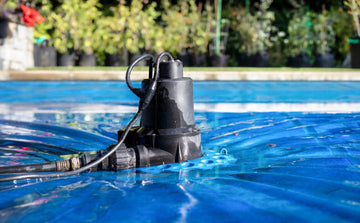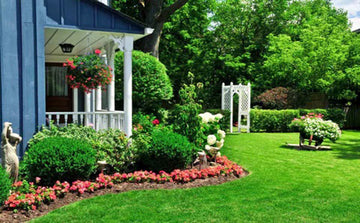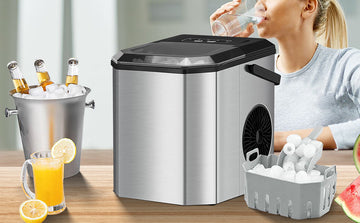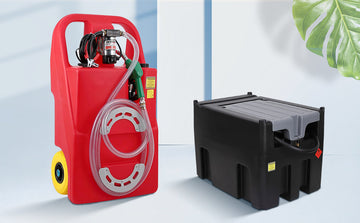The Ultimate Guide to Choosing a Swimming Pool Pump for Your Needs
Imagine you have a huge swimming pool but the water is brown, there’s algae and dirt - basically, it’s contaminated, would you ever want to jump in it?
No, undoubtedly. But, if you have a nice clean pool with crystal clean water, you are going to jump in, splash around, and enjoy yourself without a second thought, isn’t it? Hence, to ensure that your pool is clean and safe for swimming, you undeniably need a swimming pool pump.
In this article, we will shed light on what is a swimming pool pump, why a pool pump and filter are essential, what are types of pool pumps available and how do you choose one for your needs.

Table of Contents
What is a Swimming Pool Pump?
Key Components of a Pool Pump
Why Do You Need a Swimming Pool Pump?
Types of Swimming Pool Pumps
How to Choose a Swimming Pool Pump for Your Needs: Factors to Consider?
What is a Swimming Pool Pump?
A swimming pool filter pump is basically the heart of a pool that enables proper circulation of water. The task of the water pump is to make sure that the water doesn't stand still and that the treatment chemicals are distributed across the pool evenly.
In order to accomplish this, water is drawn in via an inlet, funneled through a filter, and then pumped back into the pool. If you do not have a pump for a swimming pool, then it is just going to be difficult or rather impossible to maintain the water quality of the pool.
Key Components of a Pool Pump
The five key components of a swimming pool pump are as follows.
-
Water Inlet: This is that section or part wherein the pool water enters the pump. Besides, the pump’s maximum flow rate of the water is basically determined by the diameter of the water inlet.
-
Water Outlet:This is the part of the swimming pool pump wherein the pool water leaves the pump. Here again, we see that the diameter of the water inlet is what actually determines your pump's maximum flow rate.
-
Filter:One of the most important parts of a good pool pump is the filter. A high-quality pool pump filter is generally made of good-quality erosion-resistant plastic. The task of a filter is to gather the leaves, dirt, debris, insects, etc., keeping the water clean and contamination-free. Additionally, the sand filter pump or a cartridge filter are the ones most commonly used in swimming pools.
-
Impeller:The impeller is perhaps the most crucial component of a swimming pool pump. The impeller is technically that part of the pool pump that spins or turns, thereby, helping drive the water out of the pump. Its operation is pretty simple, the water is basically drawn into the impeller and is then released back into the pool through the side which is slotted.
-
Motor: Thepool pump motor is what contributes to setting the pump into motion. It is the motor that technically helps turn or spin the impeller, it then draws water into the pump and expels it out again and the process continues.

Why Do You Need a Swimming Pool Pump?
Let’s first understand in much more detail why you need a swimming pool pump.
Circulation: Circulation is extremely crucial for your pool and having a swimming pool pump ensures that. The pool pump helps with water circulation, thus, ensuring that there is an even distribution of treatment chemicals such as chlorine or even bromine in the water.
Besides, proper circulation means the water is consistently moving and is not standing still because if the water is stagnant it becomes the breeding ground for algae, bacteria, and mosquitoes, etc., thereby, contaminating the pool and decreasing the water quality.
Filtration: One of the main purposes of a swimming pool pump is the filtration process. Basically, filtration works when the water is passed via an inlet, the water is then funneled through a filter which traps all dirt, leaves, etc., and then clean water is pumped back into the pool. The pool pump continuously filters the water to ensure that the pool is clean and contamination-free.
Sanitation: The pool pump contributes greatly in the sanitization process of the pool. Technically, what it does is it equally and consistently distributes all the cleansing chemicals throughout the pool, thereby, killing all harmful microorganisms that could make the water contaminated and unsafe to swim in.
Heat Distribution: The swimming pool pump also plays a very crucial role in equal heat distribution across the pool, thereby, ensuring the water temperature throughout the pool is consistent. Moreover, if the pump helps the heater function well, that also means a reduction in energy costs.
Aesthetic Appeal: The swimming pool pump of course contributes to the aesthetics of the pool. The pump’s purpose is to keep the pool free from leaves, insects, and dirt, filter the water, distribute treatment or sanitation chemicals throughout equally and ensure the water temperature is consistent throughout. Since the pool water pump does all these tasks that’s why the pool is clean and safe for swimming.
Types of Swimming Pool Pumps
Let’s take a look at the types of swimming pool pumps available.
Single-Speed Pumps
A single-speed pump as the name suggests is a pool pump that pumps the water at only one consistent speed. The initial cost of these single-speed pumps is relatively quite low, hence, they are quite budget-friendly. Besides, because they operate on one single constant speed, they are easy to use, however, they tend to consume a lot of energy due to this reason, thereby, increasing your energy costs.
Let’s understand the pros and cons of single-speed pumps below.
|
Pros |
Cons |
|
Single-speed pool pumps have quite a low initial cost. |
Only one speed means you have no other speed options.
|
|
They are quite easy to use and dependable. |
Consumes a lot of energy which means higher electricity bills.
|
|
Since they are commonly used, they are easily available. |
Can be quite noisy.
|
Dual-Speed Pumps
Next, you have the the dual-speed pump. Again, from the name itself, we know that this swimming pool pump comes with two speeds - a high and a low speed. These dual-speed pumps are expensive compared to single-speed pumps but they are way more energy-efficient, thus, saving you from paying high electricity bills.
Besides, since they have two speed options, they are way more flexible in their usage. When you need it for regular circulation, you can use the low speed, and when you need to clean, then you can use the high speed. Basically, depending on your purpose and need, you can change the speed setting of the pool pump.
Let’s understand the pros and cons of two or dual-speed pumps below.
|
Pros |
Cons |
|
Cost-efficient in the long run.
|
Expensive compared to single-speed pumps. |
|
Energy-efficient.
|
The high and low speeds need to be manually switched. |
|
Two-speed setting options make it flexible in usage.
|
Possibility of a lot of noise in the high-speed mode. |
Variable-Speed Pumps
The next swimming pool pump on our list is the variable-speed pump. Now, these pumps are quite expensive, however, they offer varied customizable speed options. Variable-speed pumps are basically “smart” pumps as they tend to adapt or adjust their speed as per the need of the task at hand. Moreover, though the initial cost of these pumps is higher compared to single-speed and dual-speed pumps, they save a lot of your energy costs because they are energy-efficient. Moreover, they aren’t noisy and are also quite durable.
Let’s understand the pros and cons of variable-speed pumps below.
|
Pros |
Cons |
|
Customizable speed settings.
|
The initial cost is higher. |
|
Energy-efficient which means low electricity costs.
|
Complex installation process. Might need a professional. |
|
Quieter operation.
|
Compatible control systems are needed for its proper use. |
Other Pumps
There are also other kinds of swimming pool pumps available such as booster and solar pumps. Unless you have a specific piece of equipment, like solar pool heating or pressure pool cleaning, these types of pumps are usually not necessary to have.
How to Choose a Swimming Pool Pump for Your Needs: Factors to Consider?
Let’s take a look at the factors you need to consider when choosing a swimming pool pump.
Assess the Size of Your Pool:
The very first thing that you need to do when choosing a correct swimming pool pump is to assess your pool size. Doing so is extremely crucial for you because the size of the pool is what will help you select the size of pump you will require. Typically, if you have a huge pool, then you would need a large pump and a small pool will need a smaller one.
Besides, you also need to take into consideration all the features of the pool. Do you have a waterfall or fountain, etc.? These added features also greatly help to determine what size of the swimming pool water pump you would need for your home or commercial purpose.
Consider the Volume of Water:
You also need to take into consideration the volume of water. It is important the pump’s flow rate matches the volume of water in your pool. Basically, you have to take into consideration how much volume of water needs to be pumped through the pool pump and filter. The flow resistance that the pump has to overcome is known as the total dynamic head, or T.D.H. The pump will need to be more powerful if the T.D.H is higher.
Take into Account the Flow Rate:
It’s crucial you take into account the flow rate of the pump. Now the flow rate of a pump is basically measured in litres per minute or L.P.M. It is important that the flow rate is compatible with the size of the pool you have. More water can be effectively moved or pumped only if the flow rate is higher. This is extremely essential for the pool’s overall cleanliness. In addition, you always have to keep in mind the filtration system of your pool when taking into account the flow rate.
Check for Energy Efficiency:
What better way to save up on money than looking for energy-efficient pumps. You could look for Energy Star-rated pumps. Variable-speed pumps comparatively to single-speed and dual-speed pumps are quite energy efficient, saving you electricity costs. Besides, built-in timers that can automatically turn off and flow rate adjustment features are among the few features that you should look for in a pool pump to save on energy and in turn your bills.
Consider the Noise Level:
Pool pumps can be extremely noisy which can be very annoying at times. Therefore, look for quieter swimming pool pumps if you know loud sounds are going to bother you.
Look for Quality and Durability:
Always look for high-quality pumps that are made of durable and good-quality materials. Pumps that are made of high-quality materials last you longer and are worth the price.
Consider the Availability of Parts and Ease of Maintenance:
When choosing a swimming pool pump ensure that the replacement parts will be easily available when needed. Also, choose one that is not very complex to maintain, and in such circumstances where maintenance would get difficult, ensure that a professional or support staff is easily available to help you.
Evaluate Budget:
You have a variety of options available out there on the market today – you have affordable pumps to costly ones. Basically, you should take the overall cost of the pump - the buying cost as well as the maintenance cost, energy cost, etc. It is advisable to always go for high-quality and energy-efficient pumps. They might cost you initially, but will help save a lot in the longer run.
In conclusion, when choosing the right swimming pool pump, keep in mind all the factors discussed above and choose what suits your needs and requirements. It goes without saying that if you have a pool, you need to maintain it and keep it free from dirt, debris, and micro-organisms. Hence, a good quality pool pump is what you should be looking for.
So, remember to not compromise on the quality of pumps if you want something more efficient and durable. Besides, it should have all those features that you would require to keep your pool crystal-clear, contamination-free, and aesthetically beautiful.


























